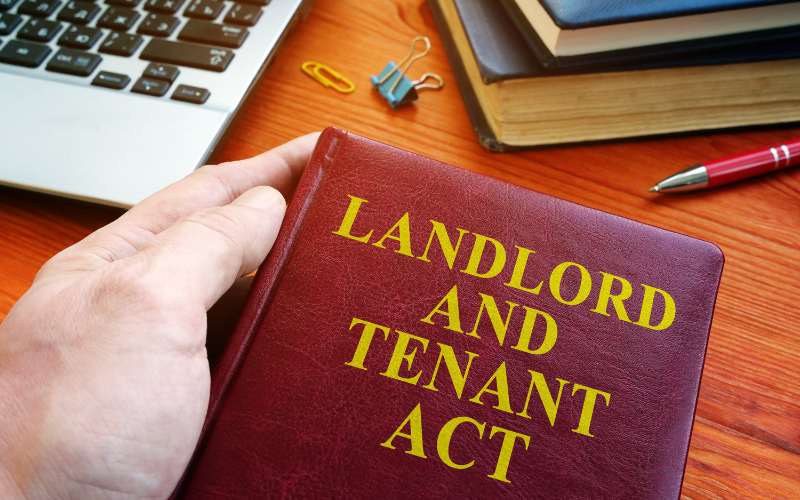Last Updated on March 18, 2024 by Kelvin Nielsen
As a tenant in Delaware, you have certain rights that are protected by law. These rights include the right to a safe and habitable living space, the right to privacy, and the right to be free from discrimination.
However, it’s important to also be aware of what your landlord cannot do, as there are certain actions that are prohibited by law.

One of the most important things to know is that landlords in Delaware are not allowed to engage in unlawful eviction practices. This means that they cannot evict you without a court order, and they cannot use self-help measures such as changing the locks or shutting off utilities to force you out of your home.
Additionally, landlords are not allowed to harass or threaten you in an attempt to get you to move out.
Another thing to be aware of is that landlords cannot enter your rental unit without your permission, except in certain circumstances such as an emergency or to make necessary repairs.
They also cannot take your personal property or withhold your security deposit unfairly. It’s important to know your rights as a tenant and to take action if you believe your landlord is violating them.
Key Takeaways
- Landlords in Delaware cannot engage in unlawful eviction practices or harass tenants.
- Tenants have the right to privacy and landlords cannot enter their rental unit without permission, except in certain circumstances.
- Landlords cannot withhold security deposits unfairly or take tenants’ personal property.
Basic Rights of a Tenant in Delaware

As a tenant in Delaware, you have certain basic rights that are protected by law. Understanding these rights can help you avoid disputes with your landlord and ensure that you are treated fairly.
Right to a Habitable Dwelling
Your landlord is required to provide you with a safe and habitable dwelling. This means that your rental unit must meet certain basic standards, such as having working plumbing, heating, and electrical systems. Your landlord is also responsible for addressing any issues that could affect your health or safety, such as mold or lead paint.
Right to Privacy
You have the right to enjoy your rental unit without interference from your landlord. Your landlord cannot enter your unit without your permission, except in certain emergency situations. Your landlord must also provide you with reasonable notice before entering your unit for non-emergency reasons, such as to make repairs.
Right to Non-Discrimination
Your landlord cannot discriminate against you based on your race, color, national origin, religion, sex, familial status, or disability. This means that your landlord cannot refuse to rent to you or treat you differently than other tenants based on any of these factors.
Right to a Written Lease
Your landlord must provide you with a written lease that outlines the terms of your tenancy. This lease should include information such as the rent amount, the length of the lease, and any rules or restrictions that apply to your tenancy. Your landlord cannot change the terms of the lease without your agreement, unless the lease allows for such changes.
Right to Security Deposit Protection
If your landlord requires a security deposit, they must place it in a separate account and provide you with written notice of the account information. Your landlord must also return your deposit within a certain timeframe after you move out, minus any deductions for damages or unpaid rent.
By understanding your basic rights as a tenant in Delaware, you can protect yourself from unfair treatment and ensure that you have a safe and comfortable place to call home.
What a Landlord Cannot Do: Overview

As a tenant in Delaware, you have certain rights and protections under the law. One of these protections is that your landlord cannot engage in certain behaviors or actions that infringe upon your rights as a tenant. Here is an overview of what a landlord cannot do in Delaware:
Discriminate Against You
Your landlord cannot discriminate against you based on your race, color, religion, sex, national origin, familial status, or disability. This means that they cannot refuse to rent to you, charge you more rent, or treat you differently because of any of these factors.
Retaliate Against You
If you make a complaint to your landlord about a repair issue or a violation of your rights, they cannot retaliate against you. This means that they cannot raise your rent, evict you, or take other negative actions against you because you exercised your rights as a tenant.
Enter Your Home Without Notice
Your landlord cannot enter your rental unit without giving you reasonable notice and obtaining your consent. In most cases, they must give you at least 24 hours’ notice before entering your home. There are some exceptions, such as in cases of emergency or if you have abandoned the property.
Violate Your Privacy
Your landlord cannot violate your privacy by searching your rental unit without your consent or a court order. They also cannot install surveillance cameras or other monitoring devices without your knowledge and consent.
Ignore Your Repair Requests
Your landlord has a legal obligation to maintain your rental unit in a habitable condition. This means that they must make necessary repairs to keep your home safe and livable. If you make a repair request, they cannot ignore it or refuse to make the necessary repairs.
By understanding what a landlord cannot do in Delaware, you can better protect your rights as a tenant and ensure that you have a safe and comfortable place to call home.
Unlawful Eviction Practices

As a landlord in Delaware, you must follow the proper legal procedures when evicting a tenant. Any deviation from the law can lead to severe consequences, including fines and lawsuits. Here are some unlawful eviction practices that you must avoid:
- Self-help eviction: You cannot evict a tenant by changing the locks, turning off the utilities, or removing their belongings from the rental unit. These actions are considered self-help evictions and are illegal in Delaware.
- Retaliatory eviction: You cannot evict a tenant in retaliation for exercising their legal rights, such as complaining about a housing violation or joining a tenant organization.
- Discriminatory eviction: You cannot evict a tenant based on their race, religion, national origin, gender, sexual orientation, or any other protected characteristic. Doing so is a violation of fair housing laws.
- Illegal notice: You must provide the tenant with the proper notice before filing an eviction lawsuit. In Delaware, the notice period varies depending on the reason for eviction. For example, you must give a 5-day notice for nonpayment of rent and a 30-day notice for no cause.
If you engage in any of these unlawful eviction practices, you may face legal action and be required to pay damages to the tenant. Therefore, it’s crucial to follow the proper legal procedures when evicting a tenant in Delaware.
Related Posts:
- “How Long Does It Take to Evict a Tenant in Delaware?”
- “How to Evict a Roommate in Delaware?”
- “How to Evict a Family Member in Delaware?”
- “5 Day Eviction Notice in Delaware”
- “30 Day Notice to Vacate in Delaware”
Improper Access to Tenant’s Property

As a landlord in Delaware, there are certain limitations to accessing your tenant’s property. Improper access can lead to legal issues and damages. Here are some things you should know:
Notice Requirement
As a landlord, you must provide reasonable notice before entering your tenant’s property. This notice should be in writing and must include the date, time, and reason for the entry. The notice should be given to the tenant at least 48 hours in advance, except in emergency situations.
Emergency Situations
In emergency situations, such as a fire or flood, you may enter the tenant’s property without notice. However, you should still make reasonable efforts to inform the tenant of the entry as soon as possible.
It is also important to note that you cannot use your key to enter the tenant’s property without their permission, except in emergency situations. Doing so can result in legal action against you.
Remember, as a landlord, it is your responsibility to respect your tenant’s privacy and property. Failure to do so can lead to legal consequences and damage to your reputation.
Unfair Lease Terms and Conditions
As a landlord in Delaware, you have a lot of power when it comes to drafting lease agreements. However, there are certain lease terms and conditions that are considered unfair and are prohibited by law. Here are some examples of what you cannot do as a landlord:
1. Prohibit Guests
You cannot prohibit your tenants from having guests over to their rental unit. This includes overnight guests. However, you can limit the number of guests and require your tenants to notify you if they plan to have a large gathering.
2. Charge Excessive Fees
You cannot charge your tenants excessive fees for late rent payments, bounced checks, or other reasons. Delaware law specifies the maximum amount that can be charged for these fees.
3. Prohibit Legal Activities
You cannot prohibit your tenants from engaging in legal activities in their rental unit. For example, you cannot prohibit them from smoking or owning pets if it is legal to do so in Delaware.
4. Require Unreasonable Conditions
You cannot require your tenants to agree to unreasonable conditions in their lease agreement. For example, you cannot require them to waive their right to sue you or to give up their security deposit.
By following these guidelines, you can ensure that your lease agreements are fair and legal. If you have any questions about what is allowed under Delaware law, it is recommended that you consult with a qualified attorney.
Withholding Security Deposit Unfairly
As a tenant in Delaware, you have certain rights when it comes to your security deposit. Your landlord cannot withhold your security deposit unfairly. Here are some things you should know about withholding security deposits in Delaware.
Legitimate Deductions
Under Delaware law, your landlord can only withhold your security deposit for certain reasons. These reasons include:
- Unpaid rent
- Damage to the rental unit beyond normal wear and tear
- Cleaning fees if you leave the rental unit excessively dirty
- Unpaid utility bills
Your landlord cannot withhold your security deposit for any other reason. If your landlord withholds your security deposit for a reason that is not legitimate, you may be able to take legal action.
Return Timeline
Your landlord must return your security deposit within 20 days of the end of your lease. If your landlord withholds any portion of your security deposit, they must provide you with an itemized list of deductions. The list must include the amount of each deduction and the reason for the deduction.
If your landlord fails to return your security deposit or provide you with an itemized list of deductions within 20 days, you may be able to take legal action.
In conclusion, as a tenant in Delaware, you have rights when it comes to your security deposit. Your landlord cannot withhold your security deposit unfairly. If you believe your landlord has withheld your security deposit unfairly, you may be able to take legal action.
Failure to Maintain Property
As a landlord in Delaware, you have a legal obligation to maintain your rental property in a safe and habitable condition. Failure to do so can result in serious consequences, including fines, legal action, and even the revocation of your rental license.
Health and Safety Standards
Under Delaware law, landlords are required to comply with certain health and safety standards to ensure the well-being of their tenants. This includes providing adequate heating, ventilation, and lighting, as well as ensuring that your property is free from hazards such as mold, lead, and asbestos.
Additionally, landlords are required to provide working smoke detectors and carbon monoxide detectors in all rental units. Failure to comply with these requirements can result in fines and legal action.
Necessary Repairs
As a landlord, you are responsible for making necessary repairs to your rental property in a timely manner. This includes fixing issues such as leaky roofs, broken windows, and malfunctioning plumbing and electrical systems.
If a tenant reports a repair issue, you must respond promptly and make a good faith effort to resolve the issue within a reasonable timeframe. Failure to do so can result in legal action and fines.
In summary, as a landlord in Delaware, it is your responsibility to maintain your rental property in a safe and habitable condition, comply with health and safety standards, and make necessary repairs in a timely manner. Failure to do so can result in serious consequences, so it is important to take these obligations seriously.
Discrimination Against Tenants
As a landlord in Delaware, you cannot discriminate against tenants based on their race, color, national origin, religion, sex, familial status, or disability. This is protected under the Fair Housing Act, which prohibits any discrimination in the sale, rental, or financing of housing.
Discrimination can take many forms, including refusing to rent to someone, charging higher rent, or providing different terms or conditions for tenancy. It is important to note that discrimination can also occur through seemingly neutral policies or practices that have a disproportionate impact on certain groups of people.
To ensure that you are not discriminating against tenants, it is important to treat all applicants and tenants equally and fairly. This includes using the same screening criteria for all applicants and providing reasonable accommodations for tenants with disabilities.
If you are found to have engaged in discriminatory practices, you may face legal consequences and financial penalties. It is important to understand and comply with fair housing laws to avoid any legal issues and to create a safe and inclusive environment for all tenants.
Retaliation Against Tenants
As a tenant in Delaware, you have certain rights that are protected by law. One of these rights is the right to file a complaint against your landlord if they are not meeting their obligations. However, some landlords may try to retaliate against you for taking action against them.
Under Delaware law, landlords are prohibited from retaliating against tenants for exercising their rights. This means that if you file a complaint or take legal action against your landlord, they cannot take any negative action against you in response.
Examples of retaliation can include raising your rent, reducing your services, or even attempting to evict you. If you believe that your landlord is retaliating against you, you should contact an attorney or a tenant advocacy group immediately.
It’s important to note that retaliation can be difficult to prove, so it’s important to keep detailed records of any communication or actions taken by your landlord. This can include emails, letters, or even recordings of conversations.
If you are able to prove that your landlord is retaliating against you, you may be entitled to damages or other forms of relief. However, it’s important to act quickly and seek legal advice as soon as possible.
In summary, retaliation against tenants is illegal in Delaware. If you believe that your landlord is retaliating against you, you should take action to protect your rights. Keep detailed records and seek legal advice if necessary.
Frequently Asked Questions
What are the responsibilities of a landlord regarding pest control in Delaware?
Landlords in Delaware are responsible for providing a rental unit that is free from pests at the time of move-in. If pests appear during the tenancy, the landlord is responsible for addressing the issue and providing pest control services. Tenants should report any pest problems to the landlord in writing as soon as possible.
What are the rights of tenants under Delaware Residential Landlord-Tenant Code?
The Delaware Residential Landlord-Tenant Code outlines the rights and responsibilities of both landlords and tenants. Tenants have the right to a safe and habitable rental unit, privacy, and protection from retaliation. They also have the right to receive notice before the landlord enters the rental unit, and to a return of their security deposit at the end of the tenancy, among other rights.
Is Delaware considered a tenant-friendly or landlord-friendly state?
Delaware has laws in place that protect the rights of both tenants and landlords. However, some may consider Delaware to be a tenant-friendly state due to the strong protections afforded to tenants under the Delaware Residential Landlord-Tenant Code.
Related Post:
What is the timeframe for a landlord to make repairs in Delaware?
Landlords in Delaware are required to make repairs in a timely manner, but the specific timeframe depends on the nature of the repair. For urgent repairs that affect the health or safety of the tenants, landlords must make repairs within 48 hours. For less urgent repairs, landlords must make repairs within a reasonable amount of time.
Can a landlord enter a rental property without permission in Delaware?
Landlords in Delaware are required to provide tenants with notice before entering the rental unit, except in cases of emergency. The notice must be given in writing and must state the reason for the entry, the date and time of the entry, and the name of the person entering the unit.
What are the restrictions on security deposits under Delaware landlord-tenant code?
In Delaware, landlords are allowed to collect a security deposit from tenants, but the amount is limited to one month’s rent. Landlords are required to return the security deposit to the tenant within 20 days of the end of the tenancy, unless there are damages or unpaid rent. Landlords must provide a written itemized list of any deductions from the security deposit.
Conclusion
As a landlord in Delaware, it is important to understand the rights and responsibilities you have when it comes to your tenants. While you have the right to collect rent and maintain your property, there are certain things that you cannot do under Delaware law.
Firstly, you cannot discriminate against tenants based on their race, gender, religion, or other protected characteristics. This includes refusing to rent to someone or treating them differently because of these factors.
Secondly, you cannot retaliate against a tenant for exercising their rights, such as filing a complaint or reporting a violation. This includes things like raising the rent or evicting them without a valid reason.
Additionally, you cannot enter a tenant’s unit without their permission or without giving proper notice, except in certain emergency situations. You also cannot shut off utilities or change locks without a court order.
Overall, it is important to be knowledgeable about what you can and cannot do as a landlord in Delaware to avoid legal issues and maintain a positive relationship with your tenants.
Disclosure: The content herein isn’t a substitute for advice from a professional attorney. It’s only meant to serve educational purposes. If you have a specific question, kindly seek expert attorney services.
Sources: Delaware Landlord Retaliation Laws, § 5514. Security deposit Laws, Warranty of Habitability in Delaware, Residential Landlord-Tenant Code,

Amanda Rose is a seasoned landlord with 13+ years of expertise in overseeing diverse properties. Her adept management spans single and family homes, along with multi-family apartments and condos, across Wyoming and South Dakota. Her commitment and proficiency have cemented her status as a thriving property management professional.
She is a member of the following organizations: Wyoming Landlord’s Association, National Association of Residential Property Managers (NARPM), Wyoming Apartment Association, South Dakota Multi-Housing Association (SDMHA), and South Dakota Landlord Association (SDLA).







